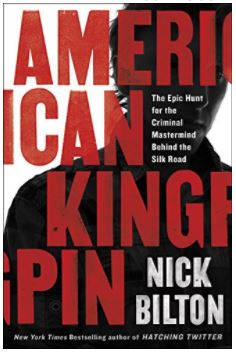
This is the 9th and final part of a discussion of Silk Road, as discussed in American Kingpin: The Epic Hunt for the Criminal Mastermind Behind the Silk Road, written by Nick Bilton. For the longer story, you may enjoy reading parts one, two, three, four, five, six, seven, and eight.
Other thoughts on the book
If you have previously been following the Silk Road story, you will enjoy the book. It reads like a good detective novel, except it is all true.
The book describes the mutual low opinion held of other federal agencies by the staff of most of the federal agencies that had a part in the investigation. This is not the first time I’ve read of those attitudes or heard of poor cooperation across agencies.
Lack of technical discussion
A couple of the reviews at Amazon indicate there is minimal technical detail in the book. That is absolutely the case.
The extent of technical explanations is to say that there is something called Tor to allow secure and anonymous communications on the ‘net, something called Bitcoin to allow anonymous transfer of money, some way to encrypt a hard drive, something called CAPTCHA is important, and a comment that it is possible to partition a hard drive (whatever that may be!).
Seriously, that is the extent of technical discussion.
Vague comments hint at a lot more technical issues at play on the part of law enforcement. TOR users can be traced and their communications read. Bitcoin transactions can be traced and pinned to specific people. Lots of comments point to federal investigators who are quite skilled at finding their way around the ‘net and quite adept at using advanced technology.
One of many heroes in the story
Discussion of the trial takes up only 10 pages. There is almost as much as the 7 pages devoted to pondering by a Homeland Security investigator on his trip home after four days of testifying at trial.
Oh, about Mr. Jared Der-Yeghiayan, that Homeland Security agent. He explained to his young son the reason for long absences from home by saying he was trying to catch a pirate.
Even a 7 year-old knows that pirates are bad people. The slightly longer version is he did a lot of the groundbreaking research that led to the capture of Mr. Ulbricht. He is one of many stars in the story.
When he returned home after the trial, his son asked daddy if he caught the pirate.
Yes, he said.
I sincerely hope as that young man grows up he will know full well that his father did yeoman’s work defending our country. He is, and will remain, a hero.
And about that unwarranted defamation of one of all-time great comedies
Ross Ulbricht adopted the nickname of Dread Pirate Roberts from the classic movie Princess Bride. Why would Mr. Ulbricht defame that wonderful comedy by associating it with a dope-peddling website?
In the movie, there are many people who were Dread Pirate Roberts. The original pirate had a horrible reputation, so bad in fact that ship captains surrendered the moment they saw the pirate’s flag appear. Eventually the original DPR grew weary of life on the sea and retired to enjoy his booty, secretly transferring the title of DPR to a selected successor. In turn, the successor eventually made enough money and passed on the title again.
The key character in Princess Bride was merely one of a long line of DPRs, each of whom retired.
Vanity Jones suggested using the name Dread Pirate Roberts. He hoped that he would become the second DPR after Mr. Ulbricht retired.
In fact, the book says that at one point Mr. Ulbricht claimed he was merely one in a line of operators of Silk Road. He didn’t set it up or operate it earlier, he was merely gifted the site to use for a while and has since passed it on to someone else. Both the previous and successor DPRs were of course not known to him. The flawed concept is that would provide believable deniability to all the crimes committed while operating the site.
So, that is the how and why Mr. Live-for-the-rest-of-his-life-in-free-federal-housing came to slander such a fabulous, delightful movie.
One final thought
Ponder yet again the distance one can travel with the be-your-own-god framework for morality and decision-making. Consider again Jeremiah 17:9 of the NIV:
The heart is deceitful above all thing and beyond cure. Who can understand it?
The story of Ross Ulbricht of website Silk Road infamy illustrates frighteningly well how deceitful and far beyond cure the human heart can go.